New report blames transit safety problems on gaps in Calgary's shelter system
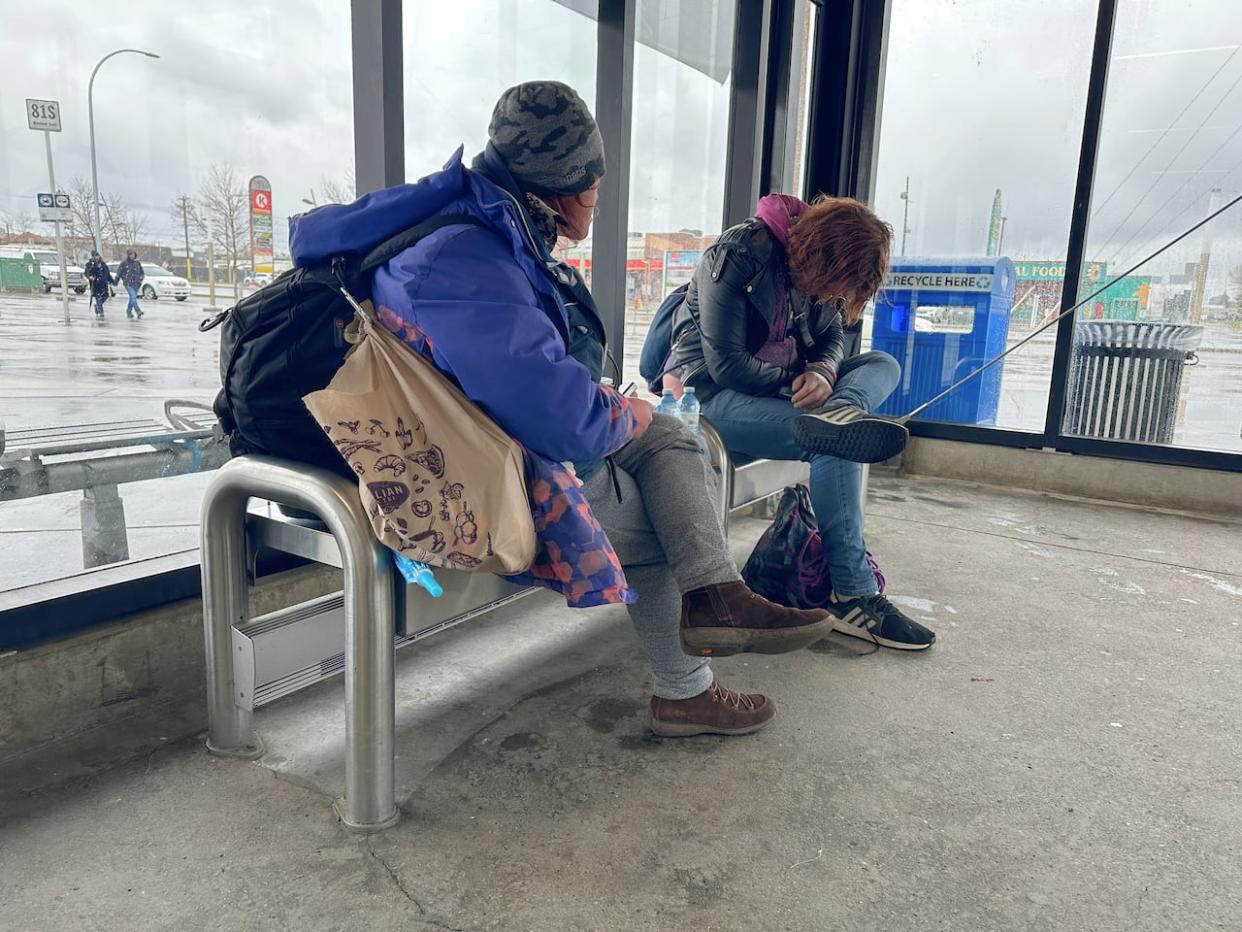
WARNING:This article includes a discussion of sexual assault.
Editor's Note: After this story was initially published, Calgary police did a detailed review of the sexual assault reports from shelters and provided revised data to CBC News. The update is reflected in this article.
A new study on transit safety says the problem doesn't start on the platforms.
It says a lack of confidence in Calgary's homeless shelter system is what's actually behind the social disorder that was pushing commuters away from the trains and buses.
"We put a lot of resources into affordable housing and we sort of forgot about our shelters," said Lee Stevens, a policy analyst with Vibrant Communities Calgary, which sponsored the study.
"We heard specifically rape, assault, fear of catching a disease, fear of getting their stuff stolen, things like that."
"It was uncomfortable to hear. But this was something that seems to be well known among those working on the front lines, on the stations — that people are genuinely afraid for their safety and they would prefer to sleep outside, frankly, or to not hang out there during the day."
Vibrant Communities Calgary is a non-profit advocacy group and it partnered with the University of Calgary and the Calgary Drop-In Centre for the study. Researchers interviewed police, transit peace officers, outreach workers and shelter users — a total of 37 people — and released the results Tuesday.
When contact by CBC News, Calgary police confirmed there have been reports of sexual assault at local homeless shelters. They had 14 reports in the past two years.
"Unfortunately, I think our shelters are very under-resourced," said Stevens, who worked with Calgary-based researcher Nick Falvo on the project.
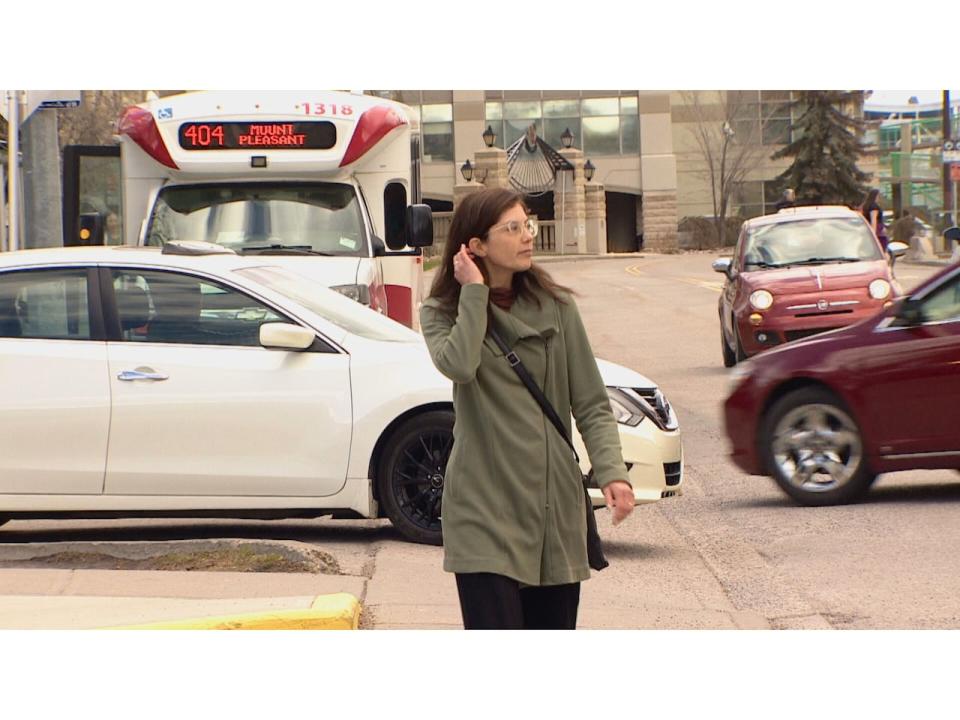
Lee Stevens is a policy and research specialist with Vibrant Communities Calgary. (Monty Kruger/CBC)
Like many transit systems across North America, Calgary Transit has struggled with lower ridership and concerns around safety, especially during and since the pandemic.
Starting last year, city council invested millions to hire more peace and security officers to improve the safety situation. Total ridership is now on track to recover by next year. Calgary Transit says its statistics show overdoses, vandalism and "non-destination" riders have decreased in the last year, suggesting the investment and their new partnerships with outreach organizations are working.
Meanwhile, Stevens and Falvo say there's an issue here that's much bigger than transit. The team found data to suggest Calgary's problem with homelessness has been growing worse.
Homelessness getting worse
Over the last five years, complaints submitted through 311 about tent encampments increased fivefold, from 1,397 in 2018 to 7,124 last year.
Also, in the midst of the ongoing struggles with opioid addiction and poisoning, deaths in public have grown. As of last fall, more people were dying in public places than in private homes, and the report suggests many people avoid using the Sheldon Chumir supervised consumption site because it doesn't allow smoking, only injection.
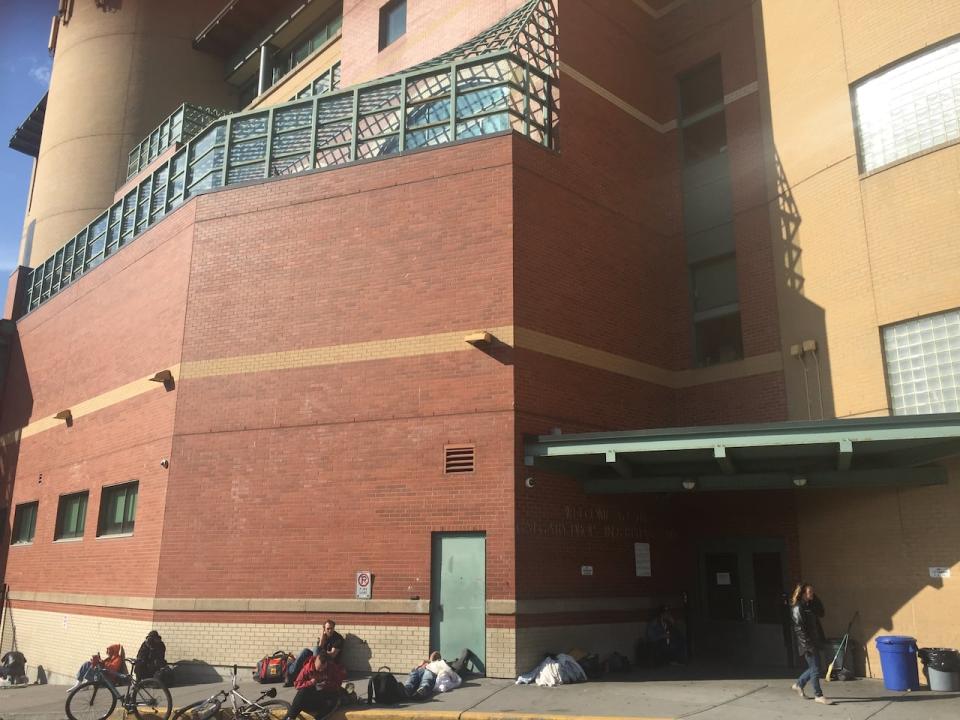
A file photo of the Drop-In Centre, one of Calgary's homeless shelters. (Evelyne Asselin/CBC)
For the study, researchers interviewed 21 police, transit peace officers and outreach workers with Alpha House. A common theme was that homeless shelters are inadequate and unsafe.
One transit peace officer is quoted as saying: "They don't want to be in the shelters. They have no desire to go to the shelters. Their stuff gets stolen, they get beat up, they get raped, they get lice … it's the last place any of them want to be. So they come to transit."
A police officer, describing a Calgary shelter, said: "You can't park in the parking lot. It looks like East Hastings, there's people just passed out everywhere. I'm like, that lady might be dead, but I need to go deal with something else."
They have no desire to go to the shelters. Their stuff gets stolen, they get beat up, they get raped, they get lice.... - Transit peace officer, quoted in the study
The officers also talked about the lack of treatment and harm reduction options, and also about the challenge getting even non-addiction related medical help for people. Members of the outreach team said there's stigma at local hospitals.
One transit officer quoted in the study said: "The frustrating part is we take [an individual] to the hospital to be seen by a doctor. Well, the doctor looks at [the physical ailment] and says it's brought on by drugs. Sorry, kicks him out, can't really help him."
And if people living rough do get admitted, there are few safe places for them to stay and heal once they've recovered enough to leave the hospital.
Sexual assault complaints at shelters
The Calgary police said they have responded to nine reports of sexual assault at the Calgary Drop-In Centre in the past two years, including four that resulted in charges.
During the same time period, there were two reports from the Mustard Seed and three from Alpha House, including one that resulted in charges.
A police spokesperson said that's in addition to instances when the person assaulted was calling from the shelter but the violence had taken place elsewhere.
The Calgary Drop-In Centre supported the research project. In a statement, president Sandra Clarkson said creating a secure and supportive environment has always been a top priority.
"We are always collecting feedback that will lead to improvements in policies and procedures."
Clarkson also said inadequate health care and high-needs supportive housing are significant challenges, especially for people with both mental health and substance-use challenges.
Shaundra Bruvall, spokeswoman for Alpha House, said the barriers faced by people who are "increasingly pushed out of public spaces" need to be better understood.
In a statement, she said emergency shelters are important but can't match the security that comes with having a home.
"Like every shelter operator, we take any allegation of violence very seriously and are committed to providing a safe environment," she said. "Safety measures in place to reduce risks are continually reviewed."
The Mustard Seed didn't respond to a request for comment.
The researchers also interviewed 16 people staying at the Drop-In Centre and the Mustard Seed. The shelter users had mixed opinions on the way peace officers interacted with people who looked rough, with some commending the officers on their respectful approach.
They also talked about a lack of daytime shelter options. That was a major theme across the interviews, said Falvo.
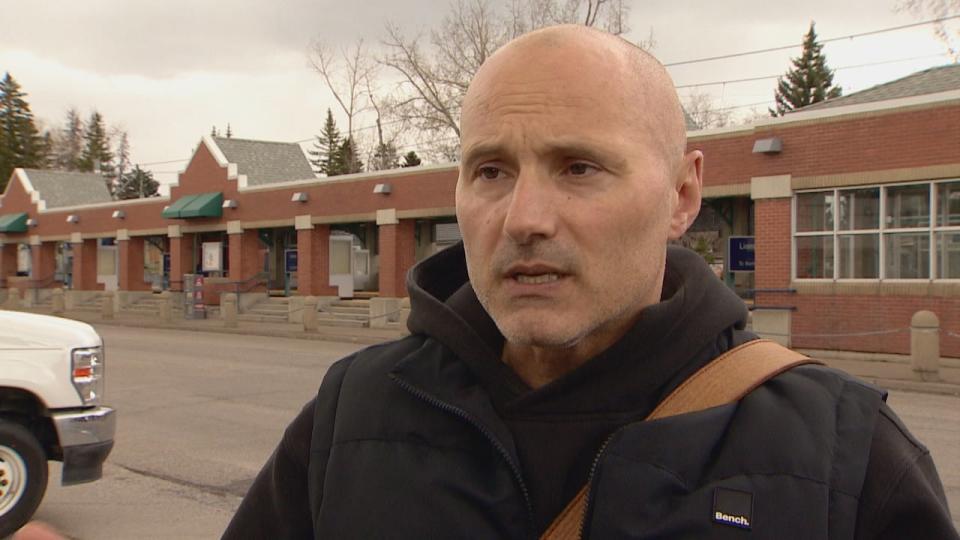
Nick Falvo is a Calgary-based research consultant who worked with Vibrant Communities Calgary and the University of Calgary on this research. (Monty Kruger/CBC)
"There is some ability to go to libraries," he said. "However, libraries aren't the optimal place for people experiencing homelessness to spend six hours or eight hours. It's not necessarily what the library was made for.
"And so people often, when they have nowhere else to go, go on public transit."
CBC News took to transit on a recent rainy day to hear what people with experience living rough and using transit had to say.
'Everywhere we turn, we're being attacked'
"What they need to do is stop worrying about the transit system and start worrying about actual things going on in the city that are an actual problem," said Alysha, who was afraid to give her last name for safety reasons.
She's 29, has been homeless for 10 months, doesn't use shelters and said it's obvious why people in her situation cause a disturbance.
"We're all on edge. We're all, we feel like we're being attacked. Everywhere we turn, we are being attacked. We are being pushed out."
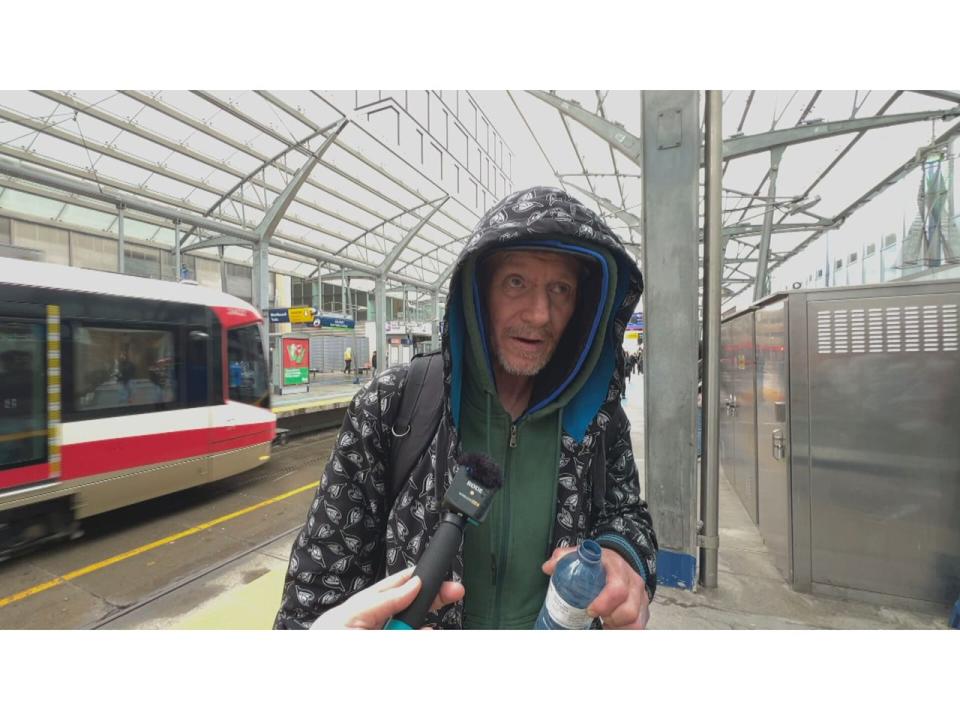
John Malcolm recently found a place to live after several years being homeless. 'One thing that you don't know until you're homeless is that you can't stop moving,' he says. (Helen Pike/CBC)
In the last few months, she said, she's seen more security on transit telling people who look rough or are pushing shopping carts to move on. But it's not just transit, "it's with all businesses. They're trying to push us away. It's just another homeless person to them. They think we're all junkies."
John Malcolm and a friend were also riding the train. Malcolm had a large suitcase full of clothes he was delivering to a person in need. His friend was pushing a shopping cart. Malcolm said he recently found an apartment after several years living rough.
"One thing that you don't know until you're homeless is that you can't stop moving," he said. "If you try to sit anywhere, and I mean anywhere — 'you guys, it's time to move along. It's time to move along.'
"Even if they're nice about it now and they're giving you a few minutes to do that instead of barking orders at you."
For anyone who has been sexually assaulted, there is support available through crisis lines and local support services via the Ending Violence Association of Canada database. If you're in immediate danger or fear for your safety or that of others around you, call 911.

 Yahoo News
Yahoo News 
